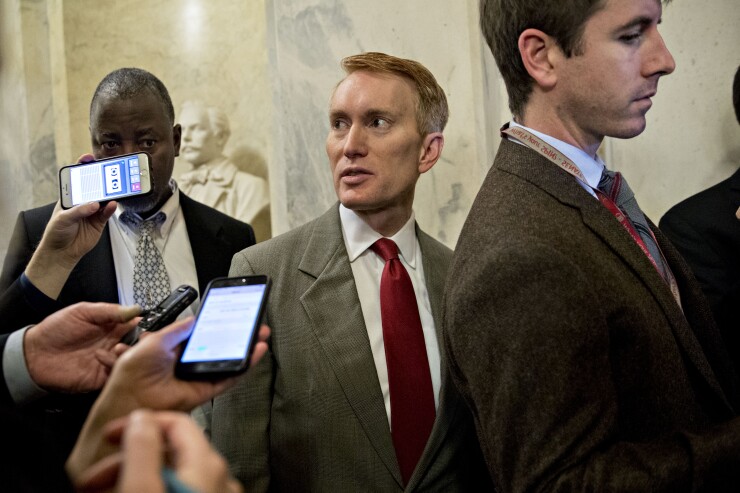WASHINGTON – One of the Senate's leading proponents of eliminating the federal tax exemption for financing professional sports stadiums says he's willing to agree to a future termination date.

"I'd be okay with that," Sen. James Lankford, R-Okla., told The Bond Buyer.
That could mean pending projects such as the Clark County, Nev. plan for a Las Vegas National Football League stadium might be able to be grandfathered.
“There are lots of ways to be able do that, whether you are grandfathering folks in or whether you do what’s called a sunrise where you look at several years,” Lankford said. “There are municipalities that are in the process of trying to determine are we going to use that bond, are we not going to use it. Allow those people that are process to be able to use it but know that it ends at a date certain.”
Lankford introduced bipartisan legislation in June with Sen. Cory Booker, D-N.J., to end the tax exemption for professional sports stadiums, mirroring a House bill introduced in March by Rep. Steve Russell, R-Okla.
A 2016 Brookings Institution report estimated $3.2 billion in federal tax revenue has been lost since 2000 through the use of tax-exempt bonds to finance construction or renovations of 36 sports stadiums. Another $500 million in revenue was lost through the tax avoidance by people who purchased those tax-exempt bonds, the report estimated.
The new Yankee Stadium in the Bronx, which opened in 2009, topped that list of sports stadium projects with the biggest tax savings. Brookings estimates the federal government lost $431 million in possible tax revenue because of the $1.7 billion in municipal bonds that helped finance the $2.5 billion cost of construction. Brookings estimates the buyers of those bonds received an additional $61 million in tax exemptions.
Tax reform legislation that recently passed the House would terminate on a retroactive basis to Nov. 2 the tax exemption for bonds used to finance for sports stadiums used by professional teams, even on a limited basis.
The Senate bill doesn’t have any provision on sports stadiums nor does it terminate private activity bonds as the House bill would do on Dec. 31.
Differences between the two tax bills are being reconciled by a House-Senate conference.
House Ways and Means Committee Chairman Kevin Brady, R-Texas, said Thursday the status of pending stadium projects such as the Las Vegas one are “to be determined.”
“Usually tax proposals are forward versus retroactive in that sense, but we haven’t had a discussion,” Brady told reporters.
Brady said the rationale for ending the tax exemption is that “stadiums are really economic development decisions made by a region or a community.
“We think the tax incentives for those stadiums should come from the region or the community rather than every taxpayer in America,” Brady said. “We want to focus tax-exempt bonds, whether they’re municipal or they’re private activity bonds, on the type of infrastructure and very high value projects that meet a test that says every taxpayer in America shall pay for part of that project.”





